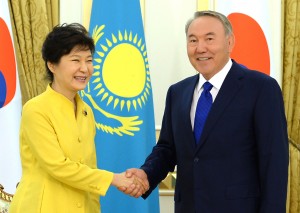 ASTANA – South Korean President Park Geun-hye paid an official visit to Kazakhstan within her Central Asian tour on June 18-19, focusing mainly on expanding economic ties and realising her vision for a barrier-free Eurasia.
ASTANA – South Korean President Park Geun-hye paid an official visit to Kazakhstan within her Central Asian tour on June 18-19, focusing mainly on expanding economic ties and realising her vision for a barrier-free Eurasia.
At a bilateral meeting of the two presidents on June 19, the main directions for discussion were strengthening high-level contacts and expanding trade, investment and technological cooperation, as well as the development of a Kazakhstan-South Korean strategic partnership.
Kazakh President Nursultan Nazarbayev and Park exchanged views on topical issues of the international agenda and checked their positions on key issues of bilateral cooperation within international and regional organisations.
Nazarbayev noted that the visit of the South Korean president is a significant event for Kazakhstan.
“Since the early days of our independence we have been studying reforms that were carried out in your country. I have met with all the presidents of South Korea, starting with Mr. Roh Tae-woo. Our relationships, which we began to build in those years, are at a very good level now. I hope your visit will create conditions for even closer cooperation. We want to have close political and economic relations with your country,” Nazarbayev said.
“Indeed, we have a broad scope for cooperation and great potential of economic interaction. Today I saw first-hand the rapidly developing Astana, which demonstrates a high level of economic growth,” Park noted.
She also expressed hope that the long-term Kazakhstan 2050 Strategy will be successfully implemented.
At the expanded meeting of delegations, Nazarbayev noted that Park’s first state visit opens a new milestone in the history of the Kazakhstan-South Korean strategic partnership. He also expressed condolences on behalf of the people of Kazakhstan in connection with the crash of the ferry Sewol.
The Kazakh president stressed that, in a short term by historical standards, South Korea has created an economic miracle, transforming from an agrarian country to a member state of the twenty leading economies in the world.
“Interaction between our two countries in the field of energy, automotives, engineering, construction, mining, healthcare, education and science is dynamically developing and the total trade volume has reached $1.5 billion. I am confident that as a result of this visit, we will be able to raise a whole new level of our cooperation in the economy and in politics,” Nazarbayev said.
He noted that Kazakhstan supports the policy of the Republic of Korea on the denuclearisation of the Korean Peninsula. In turn, the South Korea president expressed appreciation for the invitation to visit Kazakhstan.
“I attach special importance to the meeting where we discussed the issues of cooperation in all fields. Strong and friendly relations have developed between our two countries. I welcome the fact that we have discussed issues related to the international situation, including the North Korean nuclear problem,” Park said.
Park stressed that Kazakhstan is a key partner for the Republic of Korea. She also expressed her gratitude for the support of major international initiatives, including those related to the strengthening of trust within the CICA (Conference on Interaction and Confidence Building Measures in Asia) and the establishment of trust and peace on the Korean peninsula, as well as the Eurasian initiative.
During Park’s visit, the two countries pledged continued support for their ongoing joint projects worth a total of $10 billion, including the construction of a coal-fired power plant near Lake Balkhash and a petrochemical complex in the Atyrau region.
Kazakhstan is the largest destination of South Korean investment in the region, with more than 250 South Korean companies operating here. Park especially noted Kazakhstan’s policy to diversify its industries by developing the information technology, cutting-edge traffic technology and renewable energy sectors, saying these areas offer large potential for bilateral cooperation.
The meeting of the two presidents took place 10 months after they met on the sidelines of the G20 Summit of major economies in St. Petersburg, Russia, which indicated the two nations’ close and friendly ties.
During Park’s visit, the two sides also signed a memorandum of understanding (MOU) on rail cooperation.
The MOU calls for South Korean participation in the modernisation of Kazakhstan’s railways, which is expected to provide a basis for Park’s vision for a Silk Road Express that connects South Korea to Europe via North Korea, Russia and China.
The two countries also plan to sign a mutual agreement on a 30-day visa free regime.
The visit of the South Korean president also served to highlight the economic success Kazakhstan achieved after abandoning its nuclear weapons programmes. Kazakhstan’s per capita income exceeds $13,000, the highest among Central Asian nations, setting an example for North Korea to follow.
“North Korea is still unable to give up its nuclear weapons and nuclear development, so this is a big obstacle to improving inter-Korean relations. But I think the precedent set by Kazakhstan is a big lesson,” Park said in an interview with Kazakhstan’s Khabar TV channel.
Kazakhstan, which in the past had more than 1,000 nuclear warheads, achieved economic growth by voluntarily choosing to abandon its nuclear programme and in return receiving large-scale economic aid and security guarantees from the United States, Russia and Britain, Park said.
“North Korea should carefully watch Kazakhstan’s abandonment of nuclear (weapons) and its development, choose the right kind of change as soon as possible and come forward as a responsible member of the international community,” Park noted.
